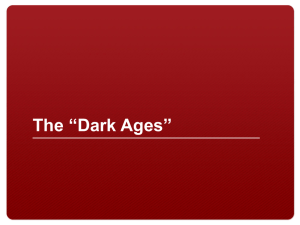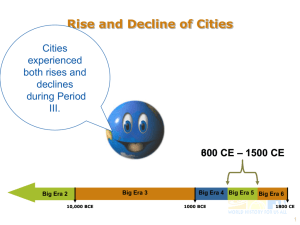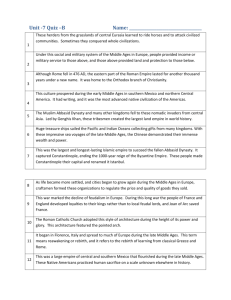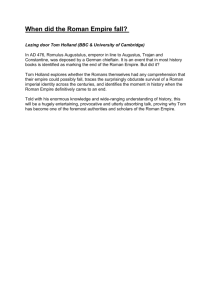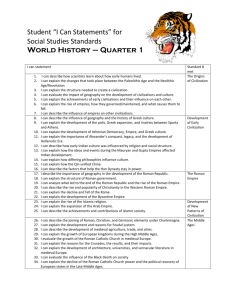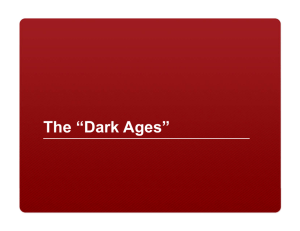Dark Ages
advertisement
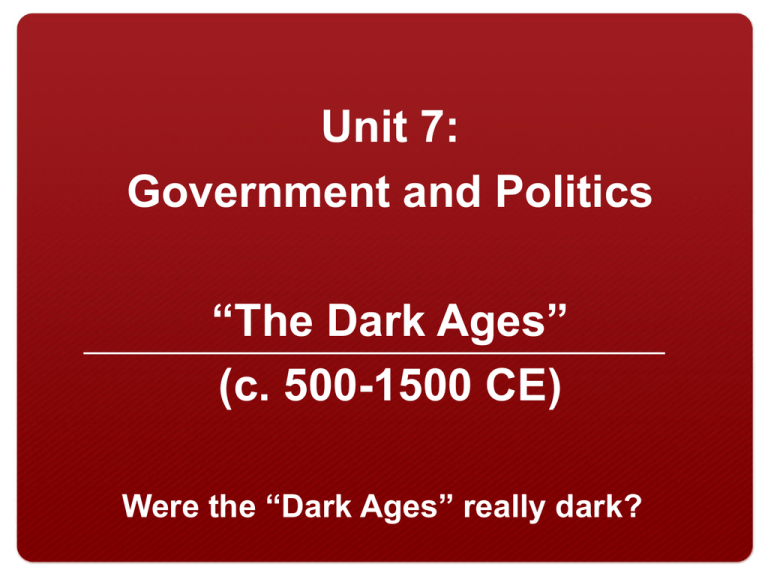
Unit 7: Government and Politics “The Dark Ages” (c. 500-1500 CE) Were the “Dark Ages” really dark? “The Dark Ages is a term applied in its widest sense to that period of intellectual depression in the history of Europe from the establishment of the barbarian supremacy in the [late] fifth century (400s CE) to the revival of learning at about the [middle] of the fifteenth (c. 1450 CE), thus nearly corresponding in extent with the Middle Ages.” - The American Cyclopaedia: A Popular Dictionary of General Knowledge, 1883 2 Background • The time period following the fall of Rome in Europe is sometimes known as the “Dark Ages.” • The term implies that the time between the fall of the Roman Empire and the European Renaissance was a period of decline for Europe. • This time is also called the Middle Ages because it falls in the middle of two important time periods: Classical Period (Greece & Rome) and the European Renaissance. 3 Roman Empire in 117 CE Frankish Kingdoms Avar Kingdom Parhae Byzantine Empire Sassanid Empire Sui China Silla Harsha’ Empire Chalukya Ghana Axum States and Empires in 600 CE 5 Yamoto Japan Carolingian Cordoba Caliphate Parhae Byzantine Silla Gurjara-Pratihara Tang China Heian Japan Abbasid Caliphate Ghana Axum Srivijaya States and Empires in 800 CE 6 6 Scandanavian Kingdoms Russia England France Spain Portugal Poland H.R.E. Mongol Empire Hungary Rum Almohad Caliphate Koryo Sung China Ayyubid Caliphate Kamakura Japan Delhi Sultanate Mali Ethiopia Oyo Angkor Benin Zimbabwe States and Empires in 1237 CE 7 Union of Kalmar Russian States Scotland England PolandHoly Roman Lithuania Empire Hungary France Portugal Castile Khanate of the Golden Horde Jagatai Khanate Ottoman Emp. Korea Timurid Empire Granada Ming China Ashikaga Japan Marinids Hafsids Mamluk Sultanate Mali Ethiopia Oyo Benin Zanj City-States Vijayanagara Siam Majapahit Zimbabwe States and Empires in 1400 CE 8 Why “Dark”? • The metaphor of “dark” and “light” was originally used by Christians to describe the “darkness” people lived in before God sent Jesus Christ to bring “light” to the world. • Petrarch was an Italian scholar during the 1300s who loved Greek and Roman writing. • He used the terms “dark” and “light” to describe learning instead of religion. He believed that Europe was in the “dark” after the “light” of the Greek and Roman empires were gone. 9 Why “Dark”? Historians, and others, since Petrach continued to use the phrase “Dark Ages.” They argued that during the centuries following the fall of the Roman Empire, Europeans lived in a time that: • • • • • • Had no central government Had a bad economy Was repeatedly invaded Did not support learning Created very little culture (art, literature, architecture, etc.) Was basically a miserable place to live 10 Today • Today many historians disagree with this term. • They think it is not the proper way to describe this period of time. • But, people continue to use term “Dark Ages.” • What do you think? Was Europe really in a “Dark Age” for almost one thousand years? 11

